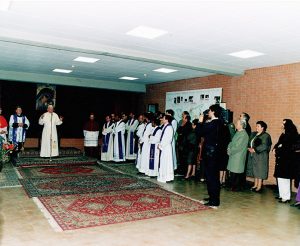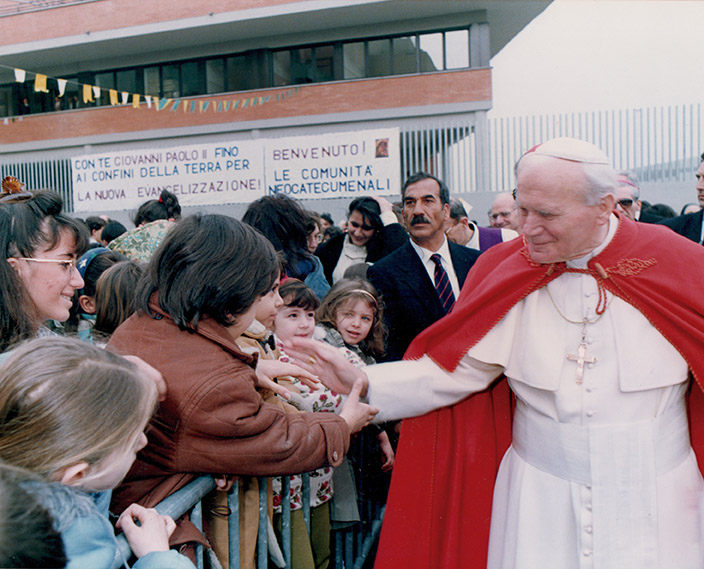Visit of Pope John Paul II to the parish of San Leonardo 03-22-1992
S. John Paul II
Rome, March 22, 1992
At the beginning of the Mass, after the liturgical greeting, the parish priest, Fr. Doménico Paiusco, welcomed the Holy Father on behalf of the community:
“Blessed Father: Welcome among us! Thank you for being with us. The parish community of San Leonardo Murialdo, entrusted to the congregation of the Josefino Fathers, has prepared for this first meeting with its bishop with joy and enthusiasm through personal and community prayer, and reflection for this event of faith in the many centers listening in families. Thirty years have passed since the beginning of the parish, in March 1958, until the consecration of this building in 1988. The current pastoral task is the construction of the spiritual temple, made of living stones, a community that is a witness and sign of Christ located in the neighborhood, with the double function of growing within it, for a spiritual burden that is, in turn, a capacity for communion, support for all who live here. The population, initially made up of young couples with children, has remained stable and, after 30 years, is on its way to old age, and most of the children, forming new family nuclei, have moved elsewhere.
Families, made up of employees and workers, many retirees, do not suffer poverty, but rather the problems inherent in old age and loneliness, and young people who still suffer for housing and work.
It is evident in many families a lack religious formation, with the consequent lack of unity between faith and life, between the appreciated Gospel and its conduct.

The primary work in the parish has always been evangelization with catechesis for all ages. A permanent catechesis of school age from 6 to 13 years, this year also for children from 3 to 6, to start them on a journey of faith where the sacraments of Reconciliation, the Eucharist and Confirmation are privileged stages. Also a catechesis for adults for a renewal of the family. The unique, but important experience of the Neocatechumenals helps me a lot. From 1971 to today, 10 communities have emerged, with nearly 400 brothers who, in addition to discovering a personal and community faith, are truly salt and leaven for the entire parish. Feeling themselves as the Church, they are available for a catechesis with parents in preparation for the Baptism of their children, with adults for Confirmation, with the bride and groom for Marriage, and with families. Every year I see distant and indifferent people approaching the Church, and families who have difficulties in marriage.
Formation and liturgical encouragement are present in the parish, the service of charity for the sick, the defenseless, the alone, and especially the charism of our Congregation, which is to help children and young people with problems in family homes. Finally, the oratory is a meeting place for children, youth and families. With a lot of dedication, a team of lay collaborators who work in it, in addition to training, promote various activities with children and young people. In this period the parish is engaged in the “confrontation with the city” on the synodical path that its diocese is leading and in which priority is given to the current condition of the family.
Blessed Father: celebrating the Eucharist with you, a strong moment of communion, marks an important stage for us to feel more Church. Your presence makes us happy because you have come among us with your great Father’s heart, capable of loving those near and far. On behalf of those near and far, we reiterate our thanks and ask for an enlightening and hopeful word that will make perseverance more fruitful when we meet with you, our Bishop, successor of Peter and vicar of Christ. We hope for a word that will give young people, disoriented by so many complaints, a valid motivation for life, and those who are no longer young, the need to be witnesses in their family and in their work environment. Thank you, Blessed Father.
“Dear John Paul II, Successor of Peter: Welcome among the boys and young people of our parish and of our youth and social center ‘San Leonardo Murialdo.’ We have greatly desired this meeting to celebrate together and to hear your word of guidance, which accompanies us as we follow in the footsteps of Jesus, our friend and savior. Today more than ever we are all: small, young, together with the Josephine lay cooperators who work in the task of human and Christian formation of the young generations. A very close family, as Saint Leonardo Murialdo wished.”
Finally, the Pope spoke and said:
“Praise Jesus Christ. I begin with this word addressed to Jesus Christ on behalf of all of us because I have followed the presentation that has been made before and it is seen that here in some sense you are different: not only by the boys of the school of sacramental catechesis, of the Scouts, but also for the different nationalities. And there are also itinerants. You feel all this diversity, but at the same time you feel a unity, a communion, a community. This community of boys, youth, and children is made through Jesus Christ.
He is the center which around everyone, we are one sole thing. This is its mystery. The mystery of Jesus, the mystery of the Son of God made man, is this: that He, by becoming man, has constituted a center of communion, of community for different people, for different environments, for different peoples. This has been seen from the beginning of the Church, from the first Christian community of Jerusalem, and then throughout the centuries when the apostles left Jerusalem to go to the different countries of the world to preach the Gospel to the different peoples and these peoples various constituted the same Church.

What is the Church? It is Christ alive among us, with us and for us. The Church is Christ alive with us and for us, always and everywhere. At the same time, the Church is us gathered around Jesus Christ, his Gospel, his Cross and his Resurrection, all of us united in Jesus Christ, not only around Him. We are not just an aggregation, we are a Church, a body, and so, gathered around Him and in Him, we are all to some extent partakers of his divine life, we are partakers of his mission, and this makes us a single thing, a community, a Church. I have spoken like that listening to the boys and the children, but they are also parents, adults who have other responsibilities: teachers. Then there is this Neocatechumenal Community, which you can feel through their songs and their enthusiasm. I want this first meeting to be a good introduction in your parish. Through your community, the spirit of the parish community is felt to some extent; is a nucleus with which the parish community has to live and grow and has to always grow arising from the life of Jesus and carrying in it the same charity that Jesus brought us.
Jesus is so present among us, who identifies, above all, with these smallest, poorest, who suffer more. He says it: “What you have done to any of these, you will have done to me.”
I wish you to live the life of Jesus and to seek and nourish more and more of the life of Christ, your Christian life, your human life, your life divinized by his presence and by his sacraments. I want to offer everyone present an introductory blessing, wishing, as I see written on these banners, that human life in this neighborhood is increasingly evangelized, and that it is increasingly steeped in the Spirit of Christ.” At the end of the celebration, the Pope greeted the priests of the Prefecture and those belonging to the Muriuldin religious community, especially the seminarians of the Josephine vocational community in the Roman province of the Immaculate.
Finally, he had a brief meeting with the adult forces of the parish, presented by the Speaker of the Pastoral Council, the deacon Giovanni Pennacchio:
“Holy Father, all the members of the parish pastoral council and those responsible for the ecclesial realities of this parish and of the different branches of pastoral activity: catechesis, liturgy, charity and youth ministry are present. Those responsible for the area are also present, admitted for the first time in the pastoral council, because since this year, in order to reach as far as possible, the people far from the parish, it has been divided into ten areas, and each area has its responsible. In addition, those responsible for the ten Neocatechumenal Communities are present, with their priests and catechists, and itinerant families in various parts of the world: Africa, Australia and Europe. We are here to renew our adherence and harmony with Peter, with his teaching, with the religious respect that is spoken of in the Lumen Gentium. Thank you for being among us.” “Thank you for this verbal presentation, but above all personal,” replied the Pope, “you see that your parish is here in Rome, in this area, but at the same time it is in many places, in many areas, in many settings, in many continents: outside of Rome. It is a missionary, itinerant, Neocatechumenal parish.”
I greet you all: Australians, Africans, French, Germans, Poles, Belarusians … The Church of Rome – you have to know – is now experiencing a period of confrontation. Confrontation means – we can say it – application above all of Vatican II, especially of the Lumen Gentium and the Gaudium et Spes. Confrontation with the different realities that characterize this city and this Roman society, important for the future of the city, of Italy and also of the Church. But it is a confrontation in which the Church is confronted and in turn confronts in faith through her bi-millennial faith.
Rome looks at the problems of our millennium, or better, from this conclusion of the second millennium. Look in faith and try to understand these problems, although they are difficult, although sometimes, they contrast with what faith tells us. Look at these problems with courage, because the Church must have courage. Christ told us: “Do not be afraid”, and this is the key word of his messianic mission and our apostolic mission. Do not be afraid. I will also say to you itinerants because you are brave. Sometimes I hear that you are afraid of some reality that you find, that faces you and that you face. Do not be afraid, because it is always about the same argument: “I am with you.” This is not just one word, it is a reality.
With a blessing to all present -the few who still remain in Rome in this parish- and the many that are in the different continents.”